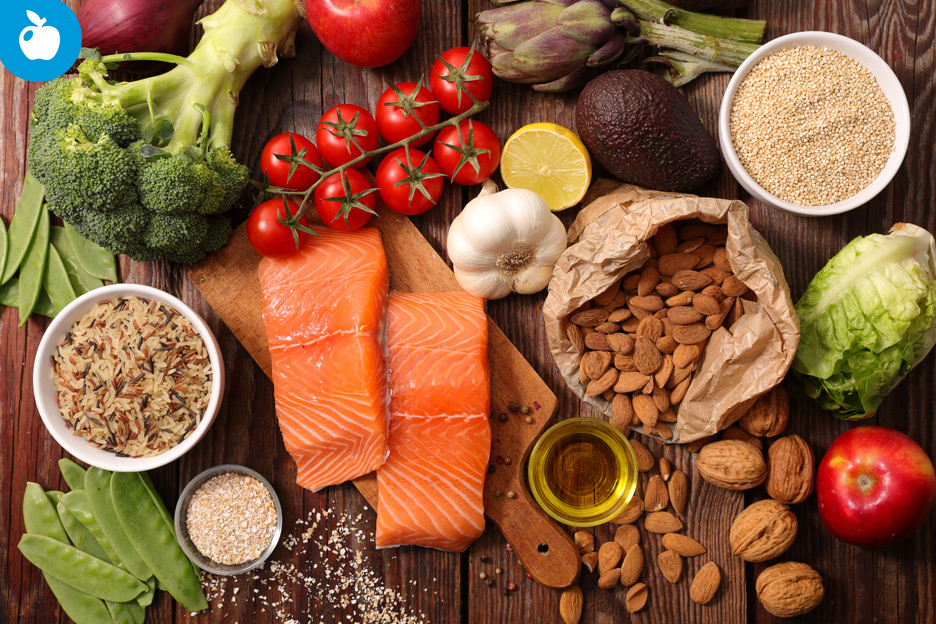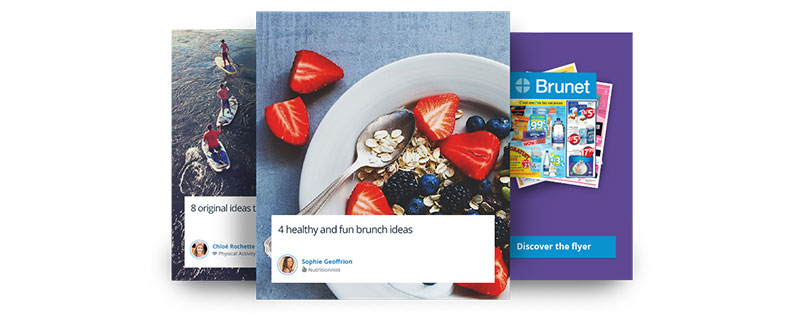When it comes to nutrition, it’s easy to get lost in an overload of information. Are the following statements true or false? Let’s take a look.

1
You shouldn’t heat olive oil – mostly FALSE
You can use olive oil to sauté vegetables. However, for cooking at high temperatures, you should use regular oil instead of first cold-pressed oil because the former is more resistant to heat. So long as no smoke rises from the pan, you’re in business!
2
You should start each day by drinking lemon water – FALSE
Because it’s a citrus fruit, lemon is a great source of vitamin C. It also contains minerals that have alkalinizing properties. Will drinking a glass of lemon water change your life? Not really. No studies have proven this claim. In fact, the acidity of lemons may harm your teeth.
3
Juices are a health elixir – FALSE
Even if the juice is organic, cold pressed and costs an arm and a leg, by removing the pulp you won’t get the indisputable benefits of fibre: a feeling of satiety, better control over your glycemic index, a positive impact on your cardiovascular health, nutrients to feed good bacteria and so forth. Additionally, fruit juices contain a significant amount of free sugars. You’re better off eating the entire fruit or vegetable or, if you’re a fan of juicing, opt for vegetable juices instead.
4
Frozen fruits and vegetables don’t contain any nutrients – FALSE
Modern freezing techniques quickly freeze the vegetables and keep them ripe, thus preserving an optimal amount of the nutrients they contain. Although this process might destroy some of the food’s vitamins and minerals, it does preserve a large amount! Freezing is a great way to conserve your fruits and vegetables year-round.
Modern freezing techniques may destroy some of the food’s vitamins and minerals, but it preserves a large amount! Freezing is a great way to conserve your fruits and vegetables year-round.
5
Coconut oil is the healthiest oil – mostly FALSE
Because coconut oil is rich in saturated fat, it does not have the same cardiovascular health benefits as olive oil or canola oil. However, it is not as harmful as trans fats or butter. You can use it occasionally, in moderation. Opt for virgin oil to get more antioxidants.
6
It’s better not to slice your vegetables and fruits ahead of time – mostly TRUE
To preserve as many nutrients as possible in your fruits and vegetables, you should eat them whole, or only cut them into pieces at the last minute and cook them quickly using the smallest amount of liquid possible (e.g., steamed). That being said, pre-cut crudités or melon can help you consume more fruits and vegetables on busy days (which can turn out to be every day) and avoid unhealthy snacks such as cookies.
7
Fat-free yogurt contains lots of sugar – FALSE
Usually, the only difference between fat-free plain yogurt and low-fat (2%) yogurt is…fat. In case of doubt, compare the list of ingredients and the grams of sugar on the nutrition label of both products. Looking to reduce your carb intake? Opt for plain yogurt with no added sugar and no thickeners such as starch.

8
Red wine is good for the heart – FALSE
Recent data shows that, contrary to popular belief, red wine is not proven to reduce the risk of heart disease. The truth is, alcohol is never good for your health. It’s a toxic substance that can have harmful effects on your body, which is why you need to be mindful of how much you drink.
To minimize the health risks associated with alcohol, it’s recommended that you limit your intake to no more than two drinks per week. Three to six drinks a week poses a moderate health risk. Having more than six drinks a week puts you at high risk of developing health issues.
9
Maple syrup and honey are better than white sugar – FALSE
Even though they contain traces of nutrients, maple syrup and honey are similar to white sugar. They are high in calories and can increase your glucose levels without making you feel full. You should use them for their exquisite taste and as a way to support local producers, not for their purported health benefits.
10
Dark chocolate is packed with antioxidants – FALSE
It’s important to know that it’s the flavonoids in cocoa beans that possess antioxidant properties. To get the same dose of flavonoids as described in scientific studies, you’d have to eat an enormous amount of chocolate, thereby consuming a ton of sugar, fat and calories. Furthermore, the process of making chocolate often destroys the flavonoids. An inconvenient truth!

11
Sea salt is healthier than table salt – FALSE
Just like the sweeteners in fact 9, the differences between sea and table salt are minimal: they both contain the same amount of sodium. It all comes down to which option you prefer. Table salt is iodized. Sea salt comes in various sizes, flavours and colours. In any case, watch your salt intake, especially if you’re at risk of developing high blood pressure.
12
Spinach is very rich in iron – mostly FALSE
Is it a source of iron? Yes. Is it a significant source of iron? No. For example, ½ cup of cooked spinach contains half the iron in ½ cup of cooked lentils and three times less iron than 1 ¼ cup of breakfast cereal. To get more iron in your diet, combine vegetables rich in iron with a source of vitamin C (ex. clementines, red bell peppers, etc.) and avoid drinking tea or coffee at mealtimes.
13
Organic foods are more nutritious – mostly FALSE
Organic foods are about as nutritious as traditionally produced foods. So why buy organic? Organic foods contain lower amounts of pesticide, their production does not harm the health of farmers, and they do not contaminate the environment as much.
14
Detox rituals are useless – TRUE
Your internal organs such as your liver and kidneys detox your body. In addition to emptying your wallet, a detox ritual or an extended fast will deprive your body of the energy and nutrients it needs to keep going. The best way to feel good is to adopt a healthy lifestyle!
15
Sushi is a healthy meal choice – TRUE AND FALSE
While fish and seaweed can have beneficial effects on your health, sushi contains a lot of white rice (a refined carb), very few vegetables and is often fried or slathered in fatty or salty sauces. For a balanced meal, start with a salad, use low-sodium soy sauce and stay away from deep-fried sushi.
Which of these answers surprised you the most? We can’t wait to read your comments on social media!
References
- Le « top » des huiles à avoir à la maison, EXTENSO, 6 mars 2013, http://www.extenso.org/article/le-top-4-des-huiles-a-avoir-a-la-maison/.
- Effets néfastes des boissons énergisantes sur votre santé buccodentaire, Ordre des hygiénistes dentaires du Québec, consulté le 13 mars, http://www.ohdq.com/ressources/documents/19360-dep_fra.pdf.
- Les jus de légumes et de fruits sont-ils bénéfiques pour la santé? LE NUTRITIONNISTE URBAIN, 2 décembre 2016, https://nutritionnisteurbain.ca/actualite/les-jus-de-legumes-et-de-fruits-sont-ils-benefiques-pour-la-sante/.
- Les fruits et les légumes en conserve sont moins bons pour la santé que les frais, EXTENSO, 3 avril 2013, http://www.extenso.org/article/les-fruits-et-les-legumes-en-conserve-sont-moins-bons-pour-la-sante-que-les-frais/.
- L’huile de noix de coco, aliment super ou super-vilain? SCIENCE & FOURCHETTE, consulté le 13 mars 2017, http://sciencefourchette.com/huile-noix-coco.
- L'huile de noix de coco est bonne pour le cœur, EXTENSO, 2 mars 2017, http://www.extenso.org/article/l-huile-de-noix-de-coco-est-bonne-pour-le-coeur/.
- Les légumes précoupés : combien d' éléments nutritifs reste-t-il? EXTENSO, 6 mars 2013, http://extenso.org/article/les-legumes-precoupes-combien-d-elements-nutritifs-reste-t-il/
- Le vin rouge est bon pour le cœur, EXTENSO, 5 janvier 2017, http://www.extenso.org/article/le-vin-rouge-c-est-bon-pour-le-coeur/
- Le sucre à fruits, le miel, le sirop d'érable et la cassonade sont meilleurs pour la santé que le sucre de table, EXTENSO, 22 octobre 2015, http://extenso.org/article/le-sucre-a-fruits-le-miel-le-sirop-d-erable-et-la-cassonade-sont-meilleurs-pour-la-sante-que-le-sucre-de-table/.
- Behind the Headlines, Nutrition Action Healthletter, Centre for Science in the Public Interest, January / February 2015, p. 3
- Le sel de mer est plus santé que le sel de table, EXTENSO, 2 mars 2017, http://extenso.org/article/le-sel-de-mer-est-plus-sante-que-le-sel-de-table/.
- Fer, EXTENSO, 17 septembre 2012, http://www.extenso.org/article/fer/.
- Les aliments biologiques sont-ils plus nutritifs? EXTENSO, 1er décembre 2016, http://www.extenso.org/article/les-aliments-biologiques-sont-ils-plus-nutritifs/.
- Cinq faits concernant les diètes détoxifiantes, Karine Gravel, 14 mai 2015, http://www.karinegravel.com/blogue/dietes-detoxifiantes.
- Nutritifs, les sushis? EXTENSO, 8 septembre 2015, http://www.extenso.org/article/nutritifs-les-sushis/.
Last updated on February 27, 2023
Have questions about your diet?
Our in-store pharmacists are happy to advise you and answer all your health questions.
